- Home
- Haruki Murakami
Sputnik Sweetheart Page 6
Sputnik Sweetheart Read online
Page 6
We used to spend hours talking. We never got tired of talking, never ran out of topics—novels, the world, scenery, language. Our conversations were more open and intimate than any lovers’.
I imagined how wonderful it would be if indeed we could be lovers. I longed for the warmth of her skin on mine. I pictured us married, living together. But I had to face the fact that Sumire had no such romantic feelings for me, let alone sexual interest. Occasionally she’d stay over at my apartment after we’d talked until the wee hours, but there was never even the slightest hint of romance. Come 2:00 or 3:00 a.m. and she’d yawn, crawl into bed, sink her face into my pillow, and fall fast asleep. I’d spread out some bedding on the floor and lie down, but I wouldn’t be able to sleep, my mind full of fantasies, confused thoughts, self-loathing. Sometimes the inevitable physical reactions would cause me grief, and I’d lie awake in misery until dawn.
It was hard to accept that she had almost no feelings, maybe none at all, for me as a man. This hurt so bad at times that it felt like someone was gouging out my guts with a knife. Still, the time I spent with her was more precious than anything. She helped me forget the undertone of loneliness in my life. She expanded the outer edges of my world, helped me draw a deep, soothing breath. Only Sumire could do that for me.
In order to ease the pain and, I hoped, eliminate any sexual tension between me and Sumire, I started sleeping with other women. I’m not saying I was a big hit with women; I wasn’t. I wasn’t what you’d call a ladies’ man and laid no claim to any special charms. For whatever reason, though, some women were attracted to me, and I discovered that if I let things take their course it wasn’t so hard to get them to sleep with me. These little flings never aroused much passion in me, at most a kind of comfort.
I didn’t keep my affairs from Sumire. She didn’t know every little detail, just the basic outlines. It didn’t seem to bother her. If there was anything in my affairs that was troubling, it was the fact that the women were all older and either were married or had fiancés or steady boyfriends. My most recent partner was the mother of one of my pupils. We’d sleep together about twice a month.
That may be the death of you, Sumire warned me once. And I agreed. But there wasn’t much I could do about it.
One Saturday at the beginning of July my class had an outing. I took all thirty-five of my pupils climbing up a mountain in Okutama. The day began with an air of happy excitement, only to wind up in total chaos. When we reached the summit, two children discovered they’d forgotten to pack their lunches in their backpacks. There weren’t any stores around, so I had to split my own nori-maki lunch the school had provided. Which left me with nothing to eat. Someone gave me some chocolate, but that was all I had the whole day. On top of which, one girl said she couldn’t walk anymore and I had to carry her piggyback all the way down the mountain. Two boys started to scuffle, half in fun, and one of them fell and banged his head on a rock. He got a slight concussion and a heavy nosebleed. Nothing critical, but his shirt was covered in blood, as if he’d been in a massacre. Like I said, total chaos.
When I got home I was as exhausted as an old railroad tie. I took a bath, downed a cold drink, snuggled into bed too tired to think, turned off the light, and settled into a peaceful sleep. And then the phone rang, a call from Sumire. I looked at the clock by my bedside; I’d only slept for about an hour. But I didn’t grumble. I was too tired even to complain. Some days are like that.
“Can I see you tomorrow afternoon?” she asked.
My woman friend was coming to my place at 6:00 p.m. She was supposed to park her red Toyota Celica a little way down the road. “I’m free till four,” I said simply.
Sumire had on a sleeveless white blouse, a navy-blue miniskirt, and a tiny pair of sunglasses. Her only accessory was a small plastic hair clip. An altogether simple outfit. She wore almost no makeup, exposed to the world as is. Somehow, though, I didn’t recognize her at first. It’d been only three weeks since we last met, but the girl sitting across from me at the table looked like someone who belonged in an entirely different world from the Sumire I knew. To put it mildly, she was thoroughly beautiful. Something inside her was blossoming.
I ordered a small glass of draft beer, and she asked for grape juice.
“I hardly recognize you these days,” I said.
“It’s that season,” she said disinterestedly, sipping at her drink with a straw.
“What season?” I asked.
“A delayed adolescence, I guess. When I get up in the morning and see my face in the mirror, it looks like someone else’s. If I’m not careful, I might end up left behind.”
“So wouldn’t it be better to just let it go, then?” I said.
“But if I lost myself, where could I go?”
“If it’s for a couple of days, you can stay at my place. You’d always be welcome—the you who lost you.”
Sumire laughed.
“All kidding aside,” she said. “Where in the world could I be heading?”
“I don’t know. Think of the bright side. You’ve quit smoking, you’re wearing nice clean clothes—even your socks match now—and you can speak Italian. You’ve learned how to judge wines, use a computer, and at least for now go to sleep at night and wake up in the morning. You must be heading somewhere.”
“But I still can’t write a line.”
“Everything has its ups and downs.”
Sumire screwed up her lips. “Would you call what I’m going through a defection?”
“Defection?” For a moment I couldn’t figure out what she meant.
“Defection. Betraying your beliefs and convictions.”
“You mean getting a job, dressing nicely, and giving up writing novels?”
“Right.”
I shook my head. “You’ve always written because you wanted to. If you don’t want to anymore, why should you? Do you think your quitting writing is going to cause a village to burn to the ground? A ship to sink? The tides to get messed up? Or set the revolution back by five years? Hardly. I don’t think anybody’s going to label that defection.”
“So what should I call it?”
I shook my head again. “The word defection’s too old-fashioned. Nobody uses it anymore. Go to some leftover commune, maybe, and people might still use the word. I don’t know the details, but if you don’t want to write anymore, that’s up to you.”
“Commune? Do you mean the places Lenin made?”
“Those are called kolkhoz. There aren’t any left, though.”
“It’s not like I want to give up writing,” Sumire said. She thought for a moment. “It’s just that when I try to write, I can’t. I sit down at my desk and nothing comes—no ideas, no words, no scenes. Zip. Not too long ago I had a million things to write about. What in the world’s happening to me?”
“You’re asking me?”
Sumire nodded.
I took a sip of my cold beer and gathered my thoughts. “I think right now it’s like you’re positioning yourself in a newfictional framework. You’re preoccupied with that, so there’s no need to put your feelings into writing. Besides, you’re too busy to.”
“Do you do that? Put yourself inside a fictional framework?”
“I think most people live in a fiction. I’m no exception. Think of it in terms of a car’s transmission. It’s like a transmission that stands between you and the harsh realities of life. You take the raw power from outside and use gears to adjust it so everything’s all nicely in sync. That’s how you keep your fragile body intact. Does this make any sense?”
Sumire gave a small nod. “And I’m still not completely adjusted to that new framework. That’s what you’re saying?”
“The biggest problem right now is that you don’t know what sort of fiction you’re dealing with. You don’t know the plot; the style’s still not set. The only thing you do know is the main character’s name. Nevertheless, this new fiction is reinventing who you are. Give it time, it’ll take you under its
wing, and you may very well catch a glimpse of a brand-new world. But you’re not there yet. Which leaves you in a precarious position.”
“You mean I’ve taken out the old transmission but haven’t quite finished bolting down the new one. And the engine’s still running. Right?”
“You could put it that way.”
Sumire made her usual sullen face and tapped her straw on the hapless ice in her drink. Finally she looked up.
“I understand what you mean by precarious. Sometimes I feel so—I don’t know—lonely. The kind of helpless feeling when everything you’re used to has been ripped away. Like there’s no more gravity, and I’m left to drift in outer space. With no idea where I’m headed.”
“Like a little lost Sputnik?”
“I guess so.”
“But you do have Miu,” I said.
“At least for now.”
For a while silence reigned.
“Do you think Miu is seeking that, too?” I asked.
Sumire nodded. “I believe she is. Probably as much as I am.”
“Physical aspects included?”
“It’s a tough call. I can’t get a handle on it yet. What her feelings are, I mean. Which makes me feel lost and confused.”
“A classical conundrum,” I said.
In place of an answer, Sumire screwed up her lips again.
“But as far as you’re concerned,” I said, “you’re ready to go.”
Sumire nodded once, unequivocally. She couldn’t have been more serious. I sank back deep into my chair and clasped my hands behind my head.
“After all this, don’t start to hate me, OK?” Sumire said. Her voice was like a line from an old black-and-white Jean-Luc Godard movie, filtering in just beyond the frame of my consciousness.
“After all this, I won’t start to hate you,” I replied.
The next time I saw Sumire was two weeks later, on a Sunday, when I helped her move. She’d decided to move all of a sudden, and I was the only one who came to help. Other than books, she owned very little, and the whole procedure was over before we knew it. One good thing about being poor, at least.
I borrowed a friend’s Toyota minivan and transported her things over to her new place in Yoyogi-Uehara. The apartment wasn’t so new or much to look at, but compared with her old wooden building in Kichijoji—a place that should be on a list of designated historical sites—it was definitely a step up. A real-estate-agent friend of Miu’s had located the place for her; despite its convenient location, the rent was reasonable, and it boasted a nice view. It was also twice as big as the old place. Definitely worth the move. Yoyogi Park was nearby, and she could walk to work if the spirit moved her.
“Starting next month I’ll be working five days a week,” Sumire said. “Three days a week seems neither here nor there, and it’s easier to stand commuting if you do it every day. I have to pay more rent now, and Miu told me it’d be better all around if I became a full-time employee. I mean, if I stay home, I still won’t be able to write.”
“Sounds like a good idea,” I commented.
“My life will get more organized if I work every day, and I probably won’t be calling you up at three-thirty in the morning. One good point about it.”
“One very good point,” I said. “But it’s sad to think you’ll be living so far away from me.”
“You really feel that way?”
“Of course. Want me to rip out my pure heart and show you?”
I was sitting on the bare floor of the new apartment, leaning against the wall. Sumire was so bereft of household goods the new place looked deserted. There weren’t any curtains in the windows, and the books that didn’t fit into the bookshelf lay piled on the floor like a bunch of intellectual refugees. The full-length mirror on the wall, a moving present from Miu, was the only thing that stood out. The caws of crows filtered in from the park on the twilight breeze. Sumire sat down next to me. “You know what?” she said.
“What?”
“If I were some good-for-nothing lesbian, would you still be my friend?”
“Whether you’re a good-for-nothing lesbian or not doesn’t matter. Imagine The Greatest Hits of Bobby Darin minus ‘Mack the Knife.’ That’s what my life would be like without you.”
Sumire narrowed her eyes and looked at me. “I’m not sure I follow your metaphor, but what you mean is you’d feel really lonely?”
“That’s about the size of it,” I said.
Sumire rested her head on my shoulder. Her hair was held back by a hair clip, and I could see her small, nicely formed ears. Ears so pretty you’d think they had just been created. Soft, easily injured ears. I could feel her breath on my skin. She had on a pair of short pink pants and a faded, plain navy-blue T-shirt. The outline of her small nipples showed through the shirt. There was a faint odor of sweat. Her sweat and mine, the two odors subtly mixed.
I wanted to hold her so badly. I was seized by a violent desire to push her down on the floor right then and there. But I knew it would be wasted effort. Suddenly I found it hard to breathe, and my field of vision narrowed. Time stood still, spinning its wheels. Desire swelled up in my trousers, hard as a rock. I was confused, bewildered. I tried to get a grip. I breathed in a lungful of fresh air, closed my eyes, and in that incomprehensible darkness I slowly began counting. My urges were so overpowering that tears came to my eyes.
“I like you, too,” Sumire said. “In this whole big world, more than anyone else.”
“After Miu, you mean,” I said.
“Miu’s a little different.”
“How so?”
“The feelings I have for her are different from how I feel about you. What I mean is . . . hmm. How should I put it?”
“We good-for-nothing heterosexuals have a term for it,” I said. “We say you get a hard-on.”
Sumire laughed. “Other than wanting to be a novelist, I’ve never wanted anything so much. I’ve always been satisfied with exactly what I have. But now, right at this moment, I want Miu. Very, very much. I want to have her. Make her mine. I just have to. There’re no other choices. Not a one. I have no idea why things worked out like this. Does that . . . make sense?”
I nodded. My penis still maintained its overpowering rigidity, and I prayed that Sumire wouldn’t notice.
“There’s a great line by Groucho Marx,” I said. “ ‘She’s so in love with me she doesn’t know anything. That’s why she’s in love with me.’ ”
Sumire laughed.
“I hope things work out,” I said. “But try your best to stay alert. You’re still vulnerable. Remember that.”
Without a word, Sumire took my hand and gently squeezed it. Her small, soft hand had a faint sheen of sweat. I imagined her hand stroking my rock-hard penis. I tried not to think that but couldn’t help it. As Sumire had said, there were no other choices. I imagined taking off her T-shirt, her shorts, her panties. Feeling her tight, taut nipples under my tongue. Spreading her legs wide, entering that wetness. Slowly, into the deep darkness within. It enticed me in, enfolded me, then pushed me out. . . . The illusion grabbed me and wouldn’t let go. I closed my eyes tight again and let a concentrated clump of time wash over me. My face turned down, I waited patiently for the overheated air to blow above me and away.
Why don’t we have dinner together? Sumire asked. But I had to take the minivan I’d borrowed back to Hino by the end of the day. More than anything else, though, I had to be alone with my violent urges. I didn’t want Sumire to get involved any more than she already was. I didn’t know how far I could control myself if she was beside me. Past the point of no return, and I might completely lose control.
“Well, let me treat you to a nice dinner sometime soon, then. Tablecloths, wine. The works. Maybe next week,” Sumire promised as we said goodbye. “Keep your schedule open for me next week.”
“OK,” I said.
I glanced at the full-length mirror as I passed by, at my face reflected in it. A strange expression was on my face. Tha
t was my face, all right, but where did that look come from? I didn’t feel like retracing my steps and investigating further.
Sumire stood at the entrance to her new place to see me off. She waved goodbye, something she rarely did.
In the end, like so many beautiful promises in our lives, that dinner date never came to be. In the beginning of August I received a long letter from her.
CHAPTER 6
The envelope had a large, colorful Italian stamp on it and was postmarked Rome, though I couldn’t make out when it had been sent.
The day the letter arrived, I’d gone out to Shinjuku for the first time in quite a while, picked up a couple of new books at the Kinokuniya bookstore, and taken in a Luc Besson movie. Afterward I stopped by a beer hall and enjoyed an anchovy pizza and a mug of dark beer. Barely beating the rush hour, I boarded the Chuo Line and read one of my new books until I arrived home at Kunitachi. I planned to make a simple dinner and watch a soccer match on TV. The ideal way to spend a summer vacation. Hot, alone, and free, not bothering anyone, and nobody bothering me.
When I got back home, there was a letter in the mailbox. The sender’s name wasn’t on the envelope, but one glance at the handwriting told me it was from Sumire. Hieroglyphic writing, compact, hard, uncompromising. Writing that reminded me of the beetles they discovered inside the pyramids of Egypt. Like it’s going to start crawling and disappear back into the darkness of history.
Rome?
I put the food I’d bought at a supermarket in the fridge and poured myself a tall glass of iced tea. I sat down in a chair in the kitchen, slit open the envelope with a paring knife, and read the letter. Five pages of stationery, from the Rome Excelsior Hotel, crammed full of tiny writing in blue ink. Must have taken a lot of time to write that much. On the last page, in one corner, was some sort of stain—coffee, perhaps.

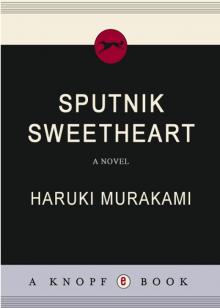 Sputnik Sweetheart
Sputnik Sweetheart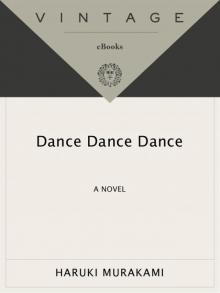 Dance Dance Dance
Dance Dance Dance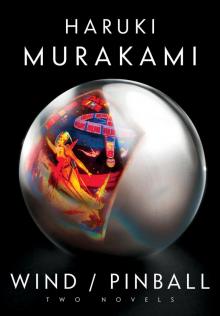 The Wind (1) and Up Bird Chronicle (2)
The Wind (1) and Up Bird Chronicle (2) Blind Willow, Sleeping Woman
Blind Willow, Sleeping Woman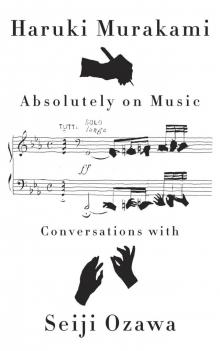 Absolutely on Music: Conversations With Seiji Ozawa
Absolutely on Music: Conversations With Seiji Ozawa Norwegian Wood
Norwegian Wood South of the Border, West of the Sun
South of the Border, West of the Sun Kafka on the Shore
Kafka on the Shore Men Without Women
Men Without Women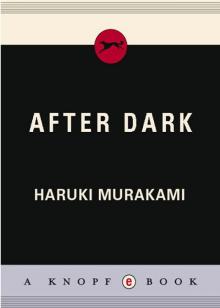 After Dark
After Dark Hard-Boiled Wonderland and the End of the World
Hard-Boiled Wonderland and the End of the World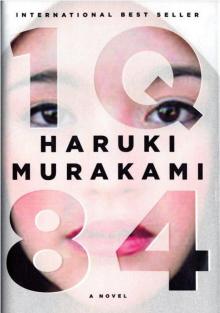 1q84
1q84 The Wind-Up Bird Chronicle
The Wind-Up Bird Chronicle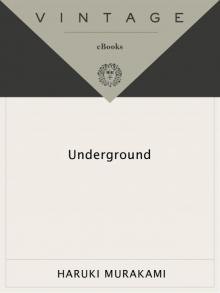 Underground: The Tokyo Gas Attack and the Japanese Psyche
Underground: The Tokyo Gas Attack and the Japanese Psyche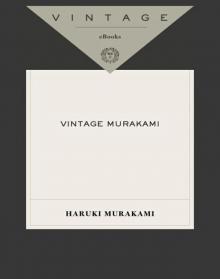 Vintage Murakami
Vintage Murakami The Elephant Vanishes: Stories
The Elephant Vanishes: Stories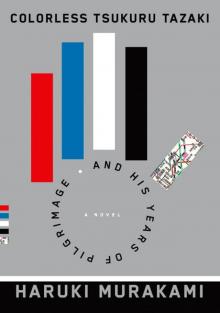 Colorless Tsukuru Tazaki and His Years of Pilgrimage
Colorless Tsukuru Tazaki and His Years of Pilgrimage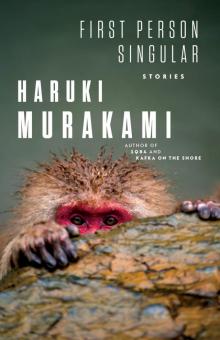 First Person Singular
First Person Singular After the Quake
After the Quake A Wild Sheep Chase
A Wild Sheep Chase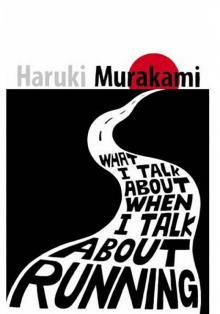 What I Talk About When I Talk About Running
What I Talk About When I Talk About Running Birthday Girl
Birthday Girl The Elephant Vanishes
The Elephant Vanishes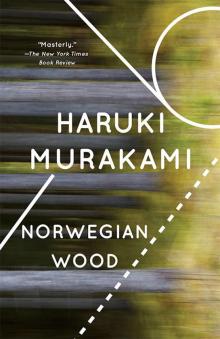 Norwegian Wood (Vintage International)
Norwegian Wood (Vintage International)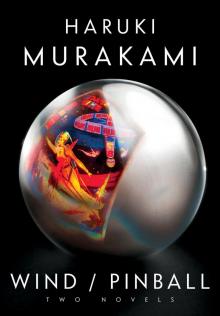 Wind/Pinball
Wind/Pinball Norwegian Wood Vol 1.
Norwegian Wood Vol 1. Underground
Underground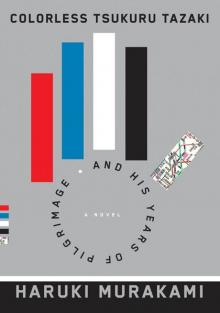 Colorless Tsukuru Tazaki and His Years of Pilgrimage: A novel
Colorless Tsukuru Tazaki and His Years of Pilgrimage: A novel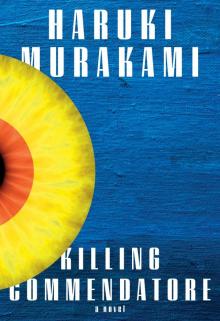 Killing Commendatore
Killing Commendatore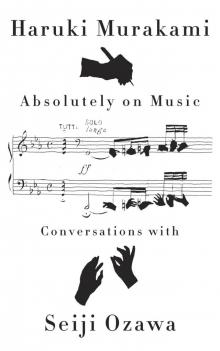 Absolutely on Music
Absolutely on Music